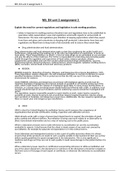M5, D4 unit 2 assignment 3
M5, D4 unit 2 assignment 3
Explain the need for current regulations and legislation in safe working practices.
• Safety is important in working practices therefore laws and regulations have to be established to
guarantee safety expectations. Laws and regulations varied with regards to various kinds of
laboratories. The laws and regulations give attention to keeping expectations which they expect
from them and given and concentrate on keeping staff protected. Laboratories have laws and
regulations are fitted there to keep track of lab standards and to ensure they remain high.
● Drug administration and food administration:
Drug administration and food administration make certain they emphasise the public health and
furthermore, safeguarding it by making use of the rules and regulations of supervision, in terms of
food safety. There responsibility is to obtain control on what drugs we are permitted to use and take
and also the affects of the medicines. The MHRA is responsible for protecting and promoting public
health through the regulation and supervision of food safety, tobacco products, dietary
supplements, prescription and over-the-counter pharmaceutical drugs (medications), vaccines,
biopharmaceuticals, blood transfusions, medical devices, electromagnetic radiation emitting devices
(RED), cosmetics, animal foods & feed and veterinary products.
● RIDDOR:
RIDDOR stands for, Reporting of Injuries, Diseases, and Dangerous Occurrences Regulations, 1995.
These Regulations require employers, the self-employed and those in control of premises to report
specified workplace incidents. This is carried out so that the HSE can see if it is a safe working
environment for workers.
Under RIDDOR, infections and dangerous occurrences with biological agents at work must be
reported. Examples of dangerous occurrences include an accident or an incident arising out of the
work, which could result in the release of a biological agent likely to cause severe human illness or
infection, or a sharps injury involving known blood/body fluid infected with a BBV. In addition, local
records should be kept of all such incidents and the underlying cause(s) should be investigated and
noted.
The regulations require responsible people to report deaths at work, major injuries caused by
accidents at work, injuries to persons not at work that require hospital treatment, injuries arising
from accidents in hospitals, and dangerous occurrences, Additionally, the law requires registered gas
fitters to report poor and dangerous gas installations.
● UKAS:
UKAS is short for United Kingdom Accreditation Service and it assesses the competence of
organisations that provide certification, testing, inspection and calibration services.
UKAS already works with a range of government departments to support the principles of good
policy making and efficient delivery. Accreditation is being used more widely as an alternative to
direct Government intervention and as a way of reducing cost to the public purse.
Where a laboratory chooses not to make reference to accreditation (or use the accreditation
symbol)in its reports, it shall ensure that the client is clearly aware of any work not covered by
accreditation, for example by separate correspondence or in the contract terms.
Great laboratory and management practice is also a part of quality assurance where it is always
ensures that all the products are made to such a quality suitable to the standard of their use as they
deliver quality guidelines for good management in the laboratories. This is very significant in
medicine and drugs as if they are not to such quality it could cause damage to the patient before it is
seen to.
When a laboratory issues reports or certificates incorporating reference to UKAS accreditation and
any of the above disclaimers, the disclaimers (or reference to the disclaimers) should be included on
the front cover or first page of each report or certificate, or wherever the reference to accreditation
occurs.




